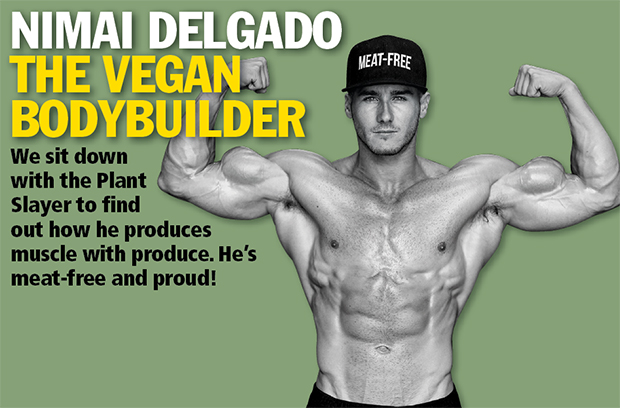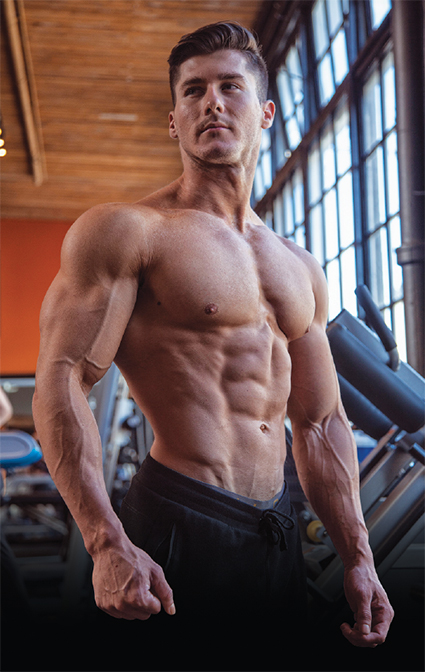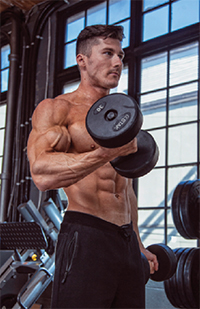Nimai Delgado Vegan Bodybuilder

We sit down with the Plant Slayer to find out how he produces muscle with produce. He’s meat-free and proud!
 THE INTERVIEW
THE INTERVIEW
MUSCLE INSIDER: You’re well known as an advocate for a vegan lifestyle. Tell us about growing up and how you came to follow this practice.
NIMAI DELGADO: My parents were born in Argentina, and in their early twenties, they made a radical life change, converted to Hinduism, renounced all material possessions, and switched to a vegetarian diet. They eventually settled in Mississippi, where I was born, on a cow sanctuary. My parents raised me vegetarian from birth, so I’ve never eaten meat.
Growing up with such a lifestyle in Mississippi, a state famous for cattle ranches and steak as well as struggling with racism, wasn’t easy. I remember waking up to see the Ku Klux Klan leaving a burning cross outside our home.
Despite the difficulties of being accepted, I stayed vegetarian but tried to hide it to avoid all the questions. I constantly had to defend myself. The reason I was vegetarian was because of the concept of ahimsa, which means to have a respect for all living beings and avoid violence towards them. Hindus try to embody ahimsa in every possible way, including the food on their plate. Try explaining that to other kids at school when you’re trying to fit in!
It was in California, where I went to university for mechanical engineering, that my love for bodybuilding really developed. I relied a lot on dairy and whey and had lots of digestive issues but thought they were normal.
My job as a mechanical engineer meant I needed to hyper-optimize processes in the oil industry and squeeze every cent out of the system to make processes more profitable. As I looked into the dairy industry, I realized it was doing exactly what I was doing in the oil industry. The problem was that living, breathing animals were simply being treated as cogs in the machine with no regard for their suffering. I decided I could no longer justify giving my dollar to supporting these companies.
After I eliminated dairy, my digestive issues went away. As I learned more about nutrition, I discovered it was normal to experience digestive issues when consuming dairy, as most adults stop producing the lactase enzyme, which is required to break down lactose—not surprising as it’s a food designed to be consumed by baby mammals that are still growing and not adults!
Without meat or whey, everyone told me I’d definitely never make it as bodybuilder on a vegan diet. So I decided to do my first show as a vegan and prove them wrong. I trained hard and swept the show, winning every division and taking home five trophies!
The human body is simply a set of systems, so I took my engineering mind-set and learned as much as I could about nutrition and how to optimize my results as a bodybuilder and be as efficient as possible in the gym.
I realized a plant-based diet wasn’t actually a disadvantage but really the optimal diet for athletes. Better blood flow, less inflammation, and faster recovery are just some of the benefits I experienced. I learned dairy consumption has been shown to increase estrogen by 26 percent and decrease testosterone within 30 to 60 minutes of ingestion, and increase inflammation. As it’s designed for a baby’s growth, dairy contains a cocktail of hormones and is also linked to a higher risk of breast and prostate cancer. I had stumbled across a diet that was not only optimal for athletes but also for longevity and health, both inside and out.
Not long after my first show, I did another show and won that as well, and shortly after, I did another show and qualified as a Pro in the IFBB.
Everyone seemed intrigued about the diet, so I thought, “Why not share this journey online?” So I started posting on Instagram and seemed to get a lot of interest. I was asked to come and give a talk on my journey in London, UK.
After the talk, a guy came up to me and hugged me and said “Thank you so much. You saved my mom’s life.” His mom had been suffering from severe type 2 diabetes and unable even to get out of bed, but my posts had inspired him to switch to a plant-based diet, and he had helped his mom switch and she was able to reverse her type 2 diabetes, get off her medication, and start living a normal life again.
I went back into my job on Monday, but I’d totally lost my passion for engineering. Despite being paid well, I knew I wasn’t spending my energy properly, so I put in my two weeks’ notice. I tried to explain to my boss why I was quitting, and he was very confused why I’d leave a safe six-figure engineering job, but he wished me the best! I followed my heart and jumped into the unknown.
More people should know about these health benefits so they can reach their peak performance, so I teamed up with leading doctors, dietitians, and other athletes to create VeganFitness.com to share evidence-based nutritional information that can benefit everyone, whether or not you’re an athlete.
MI: Can you explain the differences between vegan and vegetarian? What’s your opinion of the various offshoots of vegetarianism, such as lacto-vegetarians and ovo-vegetarians?
NIMAI: Vegan transcends a diet and is more of a lifestyle. It means someone who seeks to exclude, as far as is possible and practicable, all forms of exploitation of—and cruelty to—animals for food, clothing, or any other purpose.
I also want to note that just because someone is vegan doesn’t mean they eat healthy. Nowadays, there are plenty of junk food options that are vegan but are highly processed or contain little nutritional value.
I think these variations of vegan/vegetarianism are great. I’m a realist. Very few people can go vegan overnight. Some can, but most can’t (and won’t). It can be a huge learning curve to go from a traditional diet that you’ve eaten your whole life to a fully vegan lifestyle overnight. I think a slow reduction of the consumption and use of animal products is a great way to make a sustainable transition. I suggest phasing out animal products over the course of a few weeks or months, whatever is most realistic for you. If you end up going fully vegan, great. If you land somewhere in the middle, that’s great too. Reducing our intake of animal products can make a huge impact on not only our immediate and long-term health but also the health of our environment. After all, we have two homes, our bodies and this planet. It’s imperative that we take care of both.

MI: You compete as an IFBB pro in the Men’s Physique division. What do you say to physique athletes who think you can’t build muscle without meat?
NIMAI: Many of these guys don’t believe it simply because they’ve never seen or heard of anyone doing it before. This is one of the reasons why I decided to choose bodybuilding as my way of spreading this message. There wasn’t anyone I could point to as a reference and say “That guy is doing it,” so I decided to become that person. I had heard my entire life that I needed meat to be healthy and especially needed it in order to build muscle, even though I knew it wasn’t true. I knew that if I could compete onstage as a vegan bodybuilder without the use of any animal products (and hopefully win), there would be no question about whether or not a vegan could build muscle. Unfortunately, this wasn’t the case. The very first show I ever competed in, I won the overall. After that, people said “Yeah, but you could never go pro as a vegan.” So I made it my mission to join the IFBB pro ranks, and I did it. I’ve placed top 10 in almost every show I’ve done and top five in multiple pro shows. Now people are saying “yeah, but you could never be Mr. Olympia.” I’m still working on that one!
It’s going to take a while for the mainstream to realize you can build muscle without meat, but luckily more professional athletes are adopting this diet every day and proving you can be a champion without meat. The bottom line is that there isn’t anything magical about meat at all—you can get all your protein from plants. You can actually get optimal nutrition while avoiding the harmful components meat and dairy contain, which tremendously helps with recovery time. This diet isn’t a limitation by any means; it’s actually my secret weapon.
MI: What are your favourite plant-based protein sources and why?
NIMAI: Personally, my favourite plant based protein sources are tempeh, lentils, and protein shakes.
I love tempeh for a few reasons. It’s loaded with protein and has less carbs than lentils, so it’s a good option if you’re trying to keep your carbs lower. It’s also a great source of iron, manganese, phosphorus, magnesium, and calcium. In fact, it has about two thirds the calcium found in a cup of milk, making it a great non-dairy calcium source. Also, since it’s a fermented food, it contains prebiotics, which help promote a healthy digestive system and reduce inflammation. It’s a pretty versatile food, so you can marinate it, bake it, or sautée it. I normally cook my tempeh on a pan with some teriyaki sauce to give it a good flavour.
Lentils are another staple protein in my diet. They’re incredibly cheap to buy in bulk, and just one cup of cooked lentils has almost 20 grams of protein. Yes, that same cup does contain about 40 grams of carbs; however, these are very healthy complex carbs that help you power through workouts, so don’t be afraid to eat them. They also provide a good amount of folate, which helps convert those carbs into energy and magnesium, which is strongly associated with performance and increased testosterone production.
My last favourite protein source is a plant-based protein powder, primarily because of its convenience. I have a busy schedule, so saving time is important for me. Throwing some healthy ingredients into a blender and adding some protein powder is a quick and easy way to get in a meal while I’m in a rush or quickly chugging a shake after an intense workout. A good-tasting protein powder can also satisfy my sweet-tooth cravings when I’m on prep. I like to add just a little bit of plant milk and one scoop of protein powder and whip it into a pudding whenever I need to be strict.

MI: What are your top vegan sources of essential fats?
NIMAI: The three types of omega-3 fatty acids are alpha-linolenic acid (ALA), docosahexaenoic acid (DHA) and eicosapentaenoic acid (EPA). Only ALA is considered essential as it must be obtained from the diet. Both DHA and EPA can be synthesized from ALA. To meet your body’s requirements for ALA, you should include any of the following in your diet every day:
• 1 tbsp of ground flaxseed (it must be ground; otherwise, you won’t absorb the ALA)
• 1½ tsp chia seeds
• ½ tbsp hemp seeds
• 1 tbsp of walnut or canola oil
• ½ tbsp chopped walnuts
• 1½ tsp flaxseed oil
• 1½ tsp hemp seed oil
Some people worry about the body’s ability to convert from ALA to DHA/EPA. The conversion depends on many factors, but a good insurance policy is to take a DHA/EPA supplement made from algae (equivalent to fish oil, but containing none of the contaminants).
MI: Tell our readers about VeganFitness.com and what it has to offer.
NIMAI: VeganFitness.com is a collaboration with top athletes, doctors, and dietitians to bring you the latest in evidence-based nutrition, helping you reach optimal health and performance. We delve into the science behind why so many athletes are now switching to plant-based diets and the benefits they’re experiencing, like quicker recovery and more energy.
There are now many proven health and performance benefits to adopting a plant-based diet. We help bring these to light and present them in a way for you to start implementing these changes and experience benefits in your own life.
As well as offering meal plans, fitness programs, and online group challenges, we also offer immersive retreats where you can join us for a week in an exotic location and learn firsthand how to achieve peak performance on a plant-based diet—and have fun doing so!
VeganFitness.com will help you get started on your plant-based journey. It’s not a lifestyle change—it’s a lifestyle upgrade. Be sure to follow us on social media [see above in bio].
MI: You also have a podcast. Why did you start it and what can people expect from Generation V?
NIMAI: I started the podcast to expand what I was doing in the bodybuilding world and reach a more mainstream audience, particularly the younger generation. I decided to call it Generation V because I believe this is the generation that is going to change the world and our future is in their hands. It’s become my favorite platform. It’s an excellent way for me to have in-depth conversations with doctors, dietitians, NFL players, Olympic athletes, famous actors, and other inspiring individuals. The guests and conversations have been nothing short of incredible. I’ve had amazing individuals like a former military sniper who decided to use his combat skills to create an anti-poaching foundation in Africa to help protect the endangered wildlife.
They’re basically the SEAL Team Six of conservation. Another iconic guest I’ve interviewed is six-time Mr. Olympia Dorian Yates. We talked about the possibility of a vegan Mr. Olympia in the future. You’ll have to listen to it to see what he says.
It’s been extremely successful in its first year, and I can only hope the success continues. I’ve got my sights set high for future guests. One guy in particular: Arnold.
MI: Here’s your chance: Tell us why everyone should go vegan.
NIMAI: Have you or someone you know ever experienced the loss of a loved one prematurely due to a lifestyle-related disease like cancer, diabetes, heart disease, stroke, or Alzheimer’s? The answer is most likely yes. All of these diseases are either accelerated or prevented by the foods we decide to eat throughout our life. The science is clear that eating a plant-based diet significantly reduces our chances of ever developing these diseases and increases your chances of living a longer, healthier life.
Now, if you could go back in time and share these simple lifestyle changes with that loved one so they could have lived a longer, healthier life with you and the family, would you? Of course you would. So why wouldn’t you make these same changes so you yourself can enjoy additional healthier and happier years with your own kids and grandkids? Do it for your family.
Nimai’s 3 Favourite Fast Vegan Protein Shake Recipes
Berry Blast Smoothie Bowl

INGREDIENTS
1 scoop vegan protein powder (flavour of your choice)
4–6 oz. plant milk
1 frozen medium banana
½ cup frozen blueberries
2 tbsp ground flaxseeds
½ cup granola (no added sugar if possible)
1 handful of fresh blueberries
2–3 strawberries, sliced
DIRECTIONS
In a blender, mix the vegan protein powder, plant milk, banana, blueberries, and flaxseeds until smooth.
Pour the mixture into a bowl and top with granola, fresh blueberries and strawberries and enjoy.
MACROS
680 calories
43 g protein
76 g carbs
26 g fats
14 g fibre
Caramel Protein Shake

INGREDIENTS
1 scoop vegan protein powder (caramel flavour if possible)
8 oz. plant milk
1 frozen medium banana
2 pitted medjool dates
1 tbsp natural nut butter (use sunflower seed butter if allergic to nuts)
4 ice cubes (optional)
DIRECTIONS
Add all the ingredients to a blender and mix thoroughly. If you want that smoothie texture, you may choose to add ice cubes into the blender. Pour into a glass and enjoy.
MACROS
470 calories
32 g protein
63 g carbs
13 g fats
8 g fibre
Vegainz Bulking Smoothie

INGREDIENTS
1 scoop vegan protein powder (flavour of your choice)
8 oz. plant milk
1 tbsp ground flaxseeds
2 tbsp hemp seeds
½ cup dry oats
½ banana
2–3 strawberries
DIRECTIONS
Add all the ingredients to a blender and mix thoroughly. Pour into a glass and enjoy.
MACROS
600 calories
43 g protein
53 g carbs
24 g fats
14 g fibre
NOTE: All images provided by Nimai Delgado. Photography by Ron Perron and Reece Robinson

